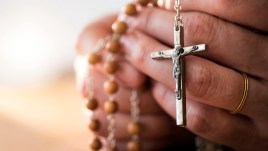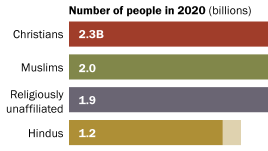
How religious is your state?
Explore our interactive database to find out how religious adults are in your state based on service attendance, prayer, belief in God, and importance of religion.
Numbers, Facts and Trends Shaping Your World
Explore our interactive database to find out how religious adults are in your state based on service attendance, prayer, belief in God, and importance of religion.
All
Publications
Easter is one of the most important religious holidays of the year for many Christians – a time to celebrate the Resurrection of Jesus Christ. According to a 2010 Pew Research Center survey, roughly half (48%) of Christians in the U.S. say they believe that Christ will definitely (27%) or probably (20%) return to earth in the next 40 years. Somewhat fewer (38%) say this definitely will not happen (10%) or probably will not happen (28%).
U.S. President Barack Obama is scheduled to visit the Middle East from March 20-23. He will spend much of the time in Israel, home to 41% of the world’s Jews. Another 41% of the world’s Jewish population lives in the United States, according to Pew Research Center estimates.
Latin America’s share of the global Catholic population has increased over the past century, according to Pew Research Center estimates, but the portion of the region’s population that is Catholic has declined.
In a new Pew Research Center poll, nearly three-quarters of U.S. Catholics say they are happy with the selection of Pope Francis. But they are divided over how big a change he represents for the church.
The percentage of U.S. Catholics with a strong identification with the Catholic Church was as low in 2012 as it has ever been in General Social Surveys. During the same period, the percentage of Protestants who consider themselves strong members of their faith has been rising.
The Pew Forum on Religion & Public Life has a variety of resources on Catholicism and Pope Benedict XVI, including public opinion polls, research studies, event transcripts and interviews.
Pope Francis was elected on Wednesday as the new leader of the Roman Catholic Church. Cardinal Jorge Mario Bergoglio hails from Argentina and becomes the first Latin American pontiff. According to Pew Research Center data on the distribution of the world’s Catholic population, the largest share of the Catholic population (39%) lives in Latin America and the Caribbean.
U.S. Catholics see the scandal over sex abuse by clergy as the most important problem facing the church today and charitable efforts to aid the poor, feed the hungry and heal the sick as the church’s most important contribution.
Nearly half of U.S. adults are connected to Catholicism. Read about going to Mass, Communion, confession and more.
Christians remain the largest religious group, and Muslims grew the fastest from 2010 to 2020. Read how the global share of Buddhists, Hindus, Jews and the religiously unaffiliated changed.
After years of decline, the U.S. Christian share now shows signs of leveling off. The new Religious Landscape Study explores trends in identity, beliefs and practices.
The Global Religious Futures (GRF) project is jointly funded by The Pew Charitable Trusts and The John Templeton Foundation. Here are some big-picture findings from the GRF, together with context from other Pew Research Center studies.











